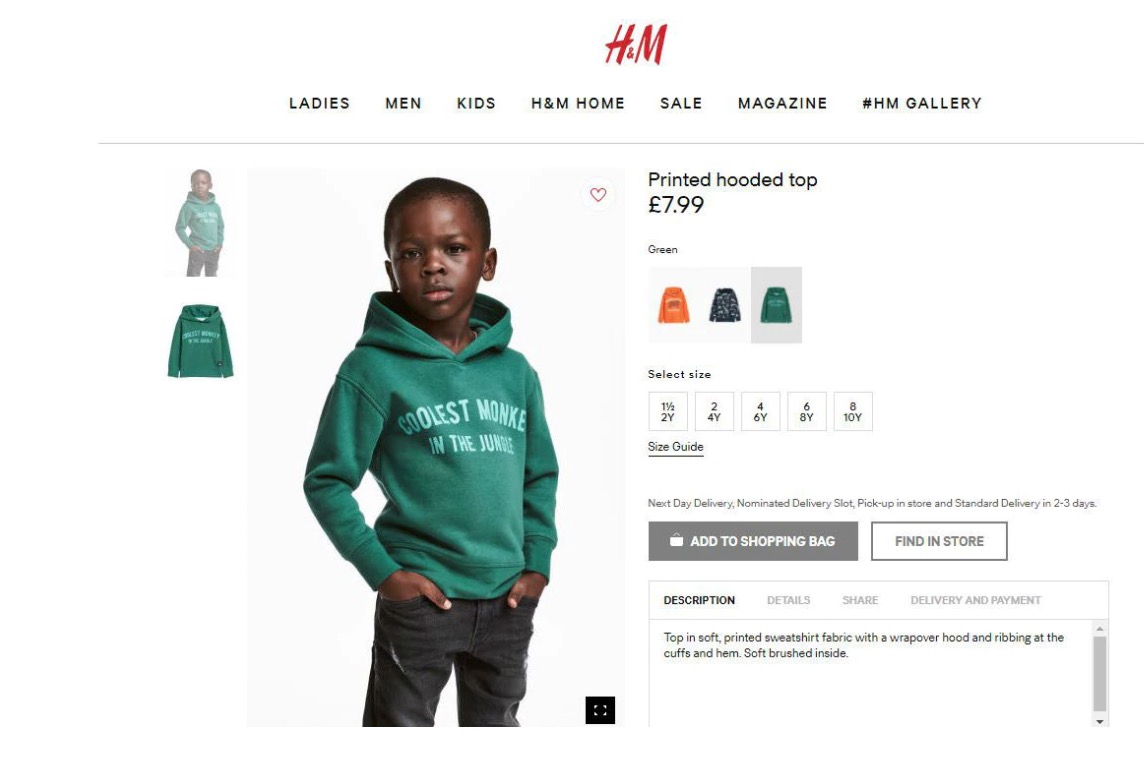
Banana Republic is currently a store known for their business casual clothing, comprised of mid-level priced, versatile yet professional clothes and accessories. The store’s target clientele includes white collar professionals, young and old, and those wishing to present an affordable, luxurious aesthetic. How could this seemingly tame store have such a problematic origin?
The clothing store Banana Republic was created in 1978 by Patricia and Mel Ziegler. Throughout the 80s, the store was known for its safari style travel clothing with styles that included photographers’ vests and pith helmets. The founders of the company described their clothing styles as “vintage military surplus clothing in a new context.” This aesthetic with merchandise names such as “French army bush hat” and “army air forces scarf” mixed with the “Somalia skirt” and “Bombay dress” allows for obvious connections between the store and its links to colonialism and imperialism.
The aesthetic of their store had matched the bad taste their clothes had been shown in. This includes the army colored jeep and giant tusks that can be seen in the front of the stores. The mix between the jungle and the safari provides harmful stereotypes which exponentially increases as the founders are white Americans, a country that isn’t very well known for their cultural sensitivity.
The name of the store is also very harmful in itself. The term “banana republic” was coined by writer O. Henry after he had escaped to Honduras in order to escape embezzlement charges. He used the term in his novel Cabbages and Kings, in which he labeled a country based on Honduras a banana republic because of its “shady government and economy that depended on bananas.” The current definition of a banana republic is a small country with a corrupt, dictatorial government whose economy is dependent on a single export commodity, such as Guatemala and their forced dependence on bananas due to the United Fruit Company. According to the New York Times the Ziegler’s were well aware of the derogatory connotation of their business’ name.
While the Ziegler’s had explained that the aesthetics of their stores and merchandise as well as the store’s name were inspired by the cultures they saw on their trips to Africa and Southeast Asia, the harmful stereotypes and references to imperialism and colonialism are very apparent. The store was bought by the corporation Gap in 1983, but they had allowed the founders creative control until the 1987 stock market crash. This event led them to transition from the safari aesthetic to the business casual attire that remains to this day.








I learned a little about the racist and problematic origins of Banana Republic in one of my classes and it was so shocking to me that the polished business clothes line used to be that way. It’s honestly shocking that its roots are tied to such a racist past. Not only that, but how were they able to change their company image so well that people don’t even know about their past? It’s also unsettling how the founders of Banana Republic knew how derogatory the connotations of the term “banana republic” was and still chose it as the name of their brand. In today’s society, the name would have received so much backlash and protests would be screaming for the company to be shut down. Cultural insensitivity was much more accepted in the past and it’s crazy to think of how things were back then. I’ve shopped at Banana Republic before and now that I know the history of the brand, it’s definitely changed by perception of them and makes me wonder how many other stores have a similar history and all us consumers are blind in the companies we are supporting.
This article really shocked me. I did not know the origin of Banana Republic but it is very disturbing to read about. Especially the meaning behind the name. I haven’t shopped there in years but this for sure makes me not want to spend another dollar at this store.
As someone who has shopped there, I never knew the origins of the name or what it even meant. It does seem to have some negative connotations attached to the name, but I don’t think they should be forced to change it. I only see it as racist if Honduras truly believes that they are a “banana republic” but if they don’t, I see how it is racist, however, the creator of the Banana Republic should still be considered racist. The NFL team “Commanders” used to be called the “Redskins” yet the NFL felt it was racist and forced them to change it. But after changing it, they seeked approval from American Indians and the majority of them actually appreciated the previous name and felt it was a way of honoring them.
Do you think a country would like to be thought of as a banana republic? A corrupt, one-trick/one-export pony? lol
The reality is every country has a variety of businesses and talented people. United Fruit Company and the US govt deliberately prevented many of these countries from doing anything other than letting themselves get taken advantage of for cheap labor and land for fruits. All while raping the land and people. And shitting on them / thinking themselves better than the locals. And you people wonder why so many Latin American countries turned to socialism (or at least tried, much to the US’s chagrin) as a means to self-rule and take back what was their’s.
As someone who has shopped there, I never knew the origins of the name or what it even meant. It does seem to have some negative connotations attached to the name, but I don’t think they should be forced to change it. I only see it as racist if Honduras truly believes that they are a “banana republic” but if they don’t, I see how it is racist, however, the creator of the Banana Republic should still be considered racist.
The United Fruit Company was more than just a large corporation, it was in fact the crownless king of Central America. It used governments as well as its own army to further its exploitation of workers, and when governments didn’t cooperate, they overthrew the governments. It is responsible for countless genocides and dozens of coops, yet the company still exists to this day, they just gave themselves a new name – Chiquita.
A quick Google search revealed the owner of banana republic is Gap inc. The owner of Gap inc is the Fisher brothers and the Fisher brothers hold stock in Apple Microsoft and Vanguard. My point in this back search is to demonstrate how little it matters to companies whether their ethical. Hollister used to be under fire for purposefully making smaller sizes to exclude “fat people” from wearing it. Brandy Melville was under fire for being racist and fatphobic. Yet these companies still pull in billions of dollars on fast fashion and overpriced items. The companies have a wide net and capitalism has made it impossible to obtain ethical items. Especially since every company is owned by select shareholders. Whether it is in the sourcing of products, the representation of POC or the disposal of overproduction all companies have pretty much been left scot-free.
Being young, I was always aware of the company, as I heard the name “Banana Republic” multiple times. With that said, I have never been into one personally or seen what the store may have looked like. I never expected the store to be as problematic as it was, some may say racist or discriminatory. Crazy to think this whole time, I had gone without knowing the past of this company.
I was not aware of the racist history behind the store’s name. The store’s history and style of clothing is rooted in white colonialism. This reminds me of how certain sports teams face controversy because they have racist mascots.
I was not aware of the problematic past that Banana Republic had, nor did I know they were owned by Gap. This reminds me of the controversial and racist naming of the athleisure brand, Lululemon.